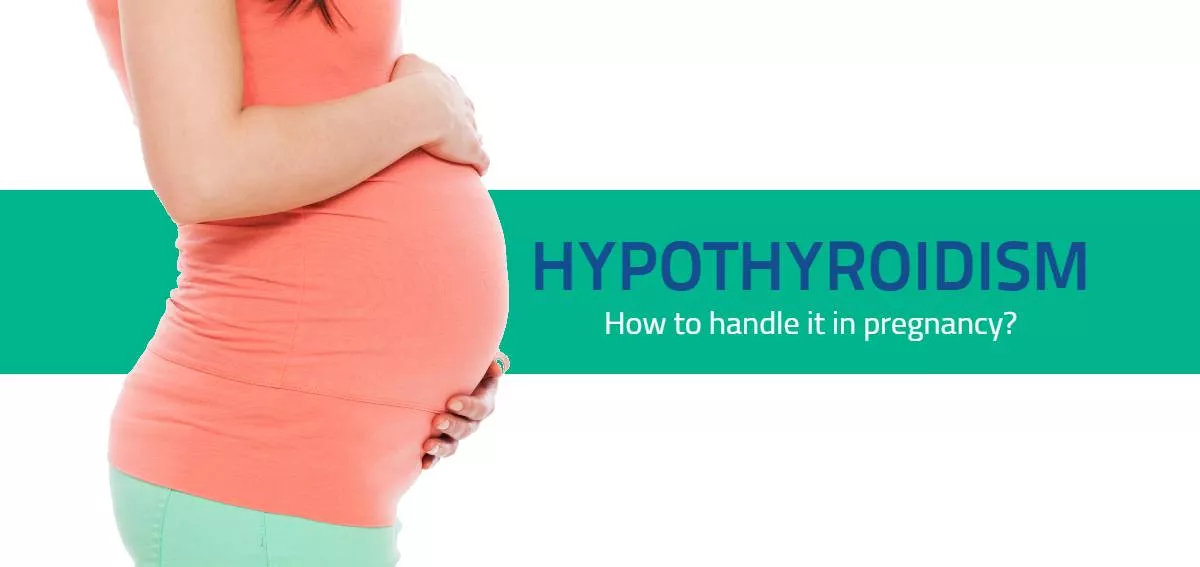Thyroid disease is the second most frequent endocrine disorder among pregnant women. It is linked to an increased risk of placental abruption, miscarriage, hypertensive disorders, and growth limitation when left untreated during pregnancy. Women at high risk, such as type 1 diabetes mellitus, those with a history of thyroid disease, another autoimmune disease, present or previous thyroid medication, or a family history of autoimmune thyroid disease, should be diagnosed early.
How does hypothyroidism affect pregnant women?
Thyroid hormones are necessary for the baby's brain and nervous system to develop normally. From the first trimester of the pregnancy, the baby starts to rely on the mother’s supply of thyroid hormone. The baby's thyroid begins to function on its own from 12 weeks of pregnancy, but it does not create adequate thyroid hormone until 18 to 20 weeks
Oestrogen and Human chorionic gonadotropin (hCG) are the two hormones related to pregnancy that elevates thyroid hormone levels in your blood. The thyroid enlarges in healthy women during the gestational period, but not enough for your physician to detect during a physical exam.
Thyroid issues can be difficult to diagnose during pregnancy because of excessive levels of thyroid hormones and other symptoms that occur in both thyroid diseases and pregnancy. If some hypothyroidism symptoms are more obvious, your doctor may prompt you to test for thyroid disorders. Postpartum thyroiditis is a thyroid illness that can develop after your baby is born.
Symptoms of hypothyroidism:
The symptoms of hypothyroidism in pregnant women are often the same as in other people with hypothyroidism. Some of the symptoms of hypothyroidism include:
- Muscle spasms
- Cold-temperature sensitivity
- Memory issues or difficulty concentrating
- Excessive exhaustion
- Weight gain
- Slow heart rate
- Intense weariness
Causes of hypothyroidism in pregnant women:
The most prevalent cause of hypothyroidism is an autoimmune condition called Hashimoto's thyroiditis. Hypothyroidism can develop during pregnancy due to the earliest symptoms of Hashimoto's thyroiditis, insufficient treatment of a woman who already has hypothyroidism due to a variety of factors, or overtreatment of a hypothyroid woman with anti-thyroid medicines. During pregnancy, about 2.5 percent of women will have a TSH of more than 6 mIU/L, and 0.4 percent will have a TSH of more than 10 mIU/L.
How can hypothyroidism affect the baby?
If hypothyroidism is not treated in the earlier stages of pregnancy, it can lead to:
- Anaemia
- Preeclampsia - the rise of blood pressure
- Stillbirth
- Low birthweight
- Miscarriage
- Congestive heart failure
Severe hypothyroidism is the most common cause of these issues.
Because thyroid hormones are so critical for your baby's brain and nervous system development, untreated hypothyroidism, especially in the first trimester, can result in a low IQ and developmental issues.
How to diagnose hypothyroidism?
Your doctor will examine your symptoms and perform blood tests to determine the levels of thyroid hormone in your body. This is to identify if Hashimoto's disease is causing your hypothyroidism. Therefore, your doctor may look for specific antibodies in your blood.
How to test for hypothyroidism?
Serum TSH (thyroid-stimulating hormone) and Thyroid hormone (thyroxine, or T4) levels will be measured in your blood. Hypothyroidism can be detected when TSH levels are higher than normal and T4 levels are lower than normal.
Treatment of Hypothyroidism in pregnancy:
Thyroid hormone replacement with Levothyroxine, a T4 hormone, is used to treat hypothyroidism. This medication is identical to the T4 produced by your body and is safe for pregnant women. Before pregnancy, it is essential that thyroid hormones are at normal levels. If you are already taking levothyroxine to treat hypothyroidism, you should have your thyroid hormone levels checked before trying to conceive. If your TSH levels are too high, you may have to increase your dose of levothyroxine. You need to delay your pregnancy until your condition is under control. If you have hypothyroidism and become pregnant, the levothyroxine dose must increase to 30% or more in the first 4 to 6 weeks of pregnancy. Following that, it's critical to keep an eye on TSH levels and maintain it below 2.5."
In today's world, nearly 5% of pregnant women have subclinical hypothyroidism. It is a type of hypothyroidism that is increased TSH with normal concentrations of T4 and T3, which means that the thyroid is struggling to keep the thyroid hormones above the normal levels. Multiple studies have shown that subclinical hypothyroidism is associated with adverse outcomes for the mother and the child.
So, if you are looking for best hypothyroidism treatment in India, then it is better to take consultation from the best obstetrics & gynaecologist in Bangalore who is renowned for treatment related to pregnancy disorders
Hypothyroidism in pregnancy guidelines:
Most guidelines recommend that thyroxine replacement be done in women with subclinical hypothyroidism.
For any queries related to thyroid, you can book an appointment at best hospital in Whitefield, Bangalore - Aster Women & Children, which offers one of the best treatments for thyroid disorders.
FAQs:
1) What is the main problem of hypothyroidism?
Hypothyroidism leads to several health-related problems like heart disease, infertility, obesity, and joint pain.
2) What are the dos and don'ts of hypothyroidism?
A person who is already affected by hypothyroidism needs to take an adequate amount of sleep and avoid stress, which may lead to stress eating and unhealthy food choices.
3) What treatment do I need?
The treatment will depend on the symptoms and how low your thyroid hormone level has dropped.
4) How often will I need to take medicine?
Most people consume thyroid medicine every day. Consult your doctor for specific advice.
5) For how long will I need to be on thyroid hormone?
Thyroid medication needs to take for life. But depending on the hormone levels, the doctor may change the dosage over time.
The source of information for the FAQs are mentioned below:
https://www.healthline.com/health/hypothyroidism/doctor-discussion-guide#8.-For-how-long-will-I-need-to-be-on-thyroid-hormone?
https://timesofindia.indiatimes.com/life-style/health-fitness/weight-loss/weight-loss-dos-and-donts-when-you-are-suffering-from-thyroid/articleshow/68616653.cms







